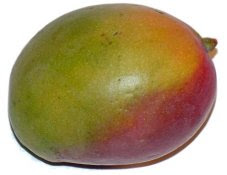
You always know the whereabouts of the riverbeds. You can see them coming, still far off in the distance as you make your way forward on your bone-jarring journey across Eastern Chad. The rivers – dry, of course – are highlighted on the horizon by the long line of lush green mango trees that seem to rise out of nowhere. Sucking sustenance from some deep water table lying dormant under the earth’s sandy floor, they grow together in mighty groves stretching as far as the eye can see. Once among them, the air changes and you can sense it. It gets cooler, fresher and is laced with a sweet fragrance that lingers above the carpet of dried leaves. You can raise your eyes without squinting and listen to the foreign sounds of monkeys rustling in treetops. Up above, you hear the creaking of a limb straining under the weight of its treasure – mangos!
These plump, juicy and fibrous fruits have been called many things throughout the ages, including such portentous titles as “fruit of the gods.” I don’t doubt that ancient mythological creatures would treasure the sweetness and sense of fulfillment one gets from devouring a ripe mango, but I am skeptical that they would actually eat one for fear of getting their hands sticky and staining their white robes.
After personally enjoying mangos on four different continents, I have come to the conclusion that the world lacks some serious mango know-how. I have seen people try to peel it, chop it, rip into it and all have managed to get themselves incredibly messy. Please, allow me to explain the best way to eat a mango, learned from the experts themselves in the dry riverbeds of Eastern Chad.
Step 1: Get a mango. Big, juicy and ripe (otherwise they are kind of sour). Look for the ones that are starting to turn reddish or yellow and not just solid green. Avoid the ones with maggots.
Step 2: Get a knife. Doesn’t have to be big, just effective.
Step 3: Stand the mango upright on a hard surface. Each mango has a broad side and a narrow side – point the narrow side towards you.
Step 4: Carefully cut off one entire broad side of the fruit. Position the knife just off-center (to avoid the hard inner core) and in one clean stroke, go from top to bottom.
Step 5: Cut the half of mango by making deep cuts in a criss-cross pattern (like tic-tac-toe). Don’t cut the skin, but go deep enough to separate the “meat” into little squares.
Step 6: Grab the cut half and flip it inside-out. Push the outer edges back and the center toward you. This will make the squares “pop out” and stand ready to be eaten. Enjoy.
Step 7: Repeat steps 3 through 6 with the other side of the mango. Enjoy again.
Step 8: With the knife, carefully peel off the skin from the remaining core.
Step 9: Hold the core in the middle with your hand and eat the fruit around the edge, similar to biting the crust off a piece of bread. Now, you have eaten an entire mango with very little mess.
Step 10: Get out the dental floss and remove the hundreds of fibers stuck between your teeth, rinse your hands and wipe your smiling face.
These 10 steps have provided many hours of succulent bliss in my life and I am glad to share them here. Unfortunately, with the current chaos and violence wreaking havoc on the areas of Eastern Chad and Darfur, there is little time to enjoy the simply pleasures provided by the mango. These lands are embroiled in what the UN calls the “world’s worst humanitarian crisis" and all food is now scarily scarce. More than 200,000 people have already died and millions more are on the verge.
We can help. We can restore peace, justice and hope to this land and its beautiful people. We can assist my friends and their families return to enjoying the simple fruits of life. For a list of things you can do, check out the 20 WAYS I CAN HELP link on the right side of this page.




